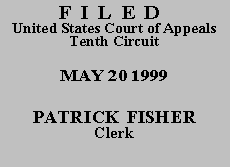 UNITED STATES COURT OF APPEALS
UNITED STATES COURT OF APPEALS
 UNITED STATES COURT OF APPEALS
UNITED STATES COURT OF APPEALS
TENTH CIRCUIT
| UNITED STATES OF AMERICA,
Plaintiff-Appellee, v. PEDRO MONTOYA-LONGORIA, Defendants-Appellants. |
No. 98-1404 (D.C. No. 98-CR-248-M) (District of Colorado) |
ORDER AND JUDGMENT(*)
Before SEYMOUR, Chief Judge, BALDOCK, and HENRY, Circuit Judges.
After examining the briefs and appellate record, this panel has determined unanimously that oral argument would not materially assist the determination of this appeal. See Fed. R. App.P.34(a); 10th Cir. R. 34.1(G). The case is therefore ordered submitted without oral argument.
The Defendant, Mr. Montoya-Longoria, pleaded guilty to re-entry subsequent to deportation following an aggravated felony in violation of 8 U.S.C. § 1326(b)(2). On appeal, Mr. Montoya-Longoria challenges his sentence. For the reasons explained below, we dismiss Mr. Montoya-Longoria's appeal for lack of jurisdiction.
Mr. Montoya-Longoria argues the sentencing court erred in refusing to grant a downward departure under § 5K2.0 of the Sentencing Guidelines, which provides that a court may depart downward if it finds that there was a mitigating circumstance "of a kind" which the Sentencing Commission did not "adequately take[ ] into consideration . . . in formulating the guidelines that should result in a sentence different from that described." U.S.S.G. § 5K2.0; 18 U.S.C. § 3553(b).
When Mr. Montoya-Longoria was deported, he received an INS Form I-294 incorrectly stating that the punishment for illegally reentering the United States was two instead of twenty years. He argues that the sentencing court should have considered the effect the erroneous INS Form I-294 had on his decision to illegally return to the United States.
Mr. Montoya-Longoria asserts the sentencing court should have considered the fact that, under a cost-benefit analysis, the risk of the erroneously stated two year sentence is outweighed by the benefit of a higher income available to aliens and their families in the United States. He implicitly asserts that if he had been aware that the penalty was twenty years, he would not have taken the chance of re-entering the country illegally. Mr. Montoya-Longoria argues that the sentencing court erred because it believed it did not have discretion under the Guidelines to consider the erroneous INS form.
"Absent the trial court's clear misunderstanding of its discretion to depart, or its imposition of a sentence which violates the law or incorrectly applies the guidelines, we have no jurisdiction to review a refusal to depart [from the Guidelines]." United States v. Belt, 89 F.3d 710, 714 (10th Cir. 1996); see also, United States v. Nelson, 54 F.3d 1540, 1544 (10th Cir. 1995) ("A discretionary refusal to depart downward is not reviewable by this court unless it appears from the record the sentencing court erroneously believed the Guidelines did not permit a downward departure."). "If the record is ambiguous concerning the district court's awareness of its discretion to depart downward, we presume the court was aware of its authority." Nelson, 54 F.3d at 1544.
The United States argues that we lack jurisdiction to review the sentencing court's discretionary decision not to depart from the Guidelines. The government asserts that the following statement by the sentencing judge indicates that he believed that he had discretion to depart from the Sentencing Guidelines on the basis of the erroneous INS form:
[O]n the downward departure based on the misleading form of the Immigration and Naturalization Service which was used in this case, and after review of the Court of Appeals decisions that the government has cited, I've determined not to follow my previous ruling, which was made without the benefit of the guidance of those cases.(1)
Certainly, as [defense counsel] Mr. Szekely points out, [the court of appeals decisions cited by the government] pre-dated the Supreme Court opinion in [Koon v. United States, 116 S.Ct 2035 (1996)], but nonetheless, I think that those courts recognized that downward departure was within the discretion of the Court, but strongly emphasized that this practice by the Immigration and Naturalization Service should not be used as grounds of the departure, principally in my view, based on the deterrent factor of these long prison terms for violating the Immigration laws.
Rec. vol. 3, at 13-14 (emphasis added).
After careful review, we agree with the government that the sentencing court believed it had discretion to permit a downward departure. In explaining its decision, the court relied on court of appeals decisions it read to grant the sentencing judge discretion to depart. At most, the record is ambiguous, and we must "presume the court was aware of its authority." Nelson, 54 F.3d at 1544.
Therefore, we lack jurisdiction to consider Mr. Montoya-Longoria's allegation of error. Accordingly, we DISMISS his appeal.
Entered for the Court,
Robert H. Henry
Circuit Judge
*. This order and judgment is not binding precedent, except under the doctrines of law of the case, res judicata, and collateral estoppel. The court generally disfavors the citation of orders and judgments; nevertheless, an order and judgment may be cited under the terms and conditions of 10th Cir. R. 36.3.
1. That "previous ruling" was issued in United States v. Lorenzo Loya-Caraveo, Case No. 95-CR-125-M. There, the judge exercised his discretion to grant a downward departure on the ground that the INS gave the defendant the same erroneous advisement that it gave to Mr. Montoya-Longoria.